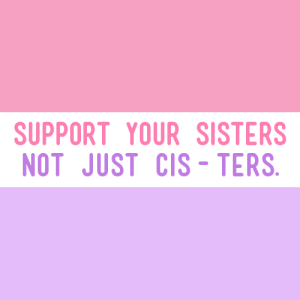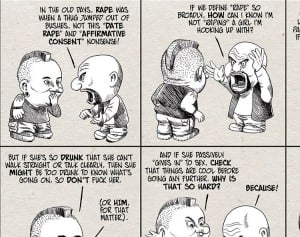Marina: This video is part of a series for Everyday Feminism, a website dedicated to helping you stand up to and break down everyday oppression.
Text: Feminist Fridays by marinashutup. *Not always on Fridays.
Marina: Do you have a friend, family member, coworker, or partner suffering with depression? If you’re a person living on this planet, chances are you do. You might even be one of the 121 million people across the globe living with depression and are simply fed up with non-mentally ill people giving you less than helpful advice.
That’s not to say these problematic comments and generally unasked for pieces of advice come from a place of malice or bad intentions. These comments are often made out of concern for the depressed individual or stem from a lack of understanding. Even as a person who suffers from depression, I’m sure I’ve unintentionally said a few of these things myself.
Unfortunately, no matter what the intent of the comment is, it can often end up doing much more harm than good. Which is why I turned to Tumblr and asked fellow depressed people about the comments they’ve received from acquaintances that they found particularly troublesome. I received over 200 messages and replies, and as I went through them, it was fairly easy to spot trends in their responses.
So without further ado, here are twelve things not to say to people with depression (and why!)
Minimizing Their Mental Illness
The first category of inappropriate comments to say to a person with depression are remarks that minimize their mental illness.
Common examples of this are phrases like:
1. ‘But You Always Seem So Happy!’
Uh, not all symptoms of depression manifest themselves as sadness.
Plenty of people are capable of putting on a happy face for others and internalizing their illness – because that’s what mentally ill people are forced to do to get through daily life.
2. ‘Everyone Gets Depressed! We All Have Our Bad Days!’
Yes, but it’s when bad days turn into bad weeks and bad months and bad years that they become a problem.
3. ‘Are You Sure It’s Not Just a Phase You’re Going Through?’
If this eleven-year bout of depression and anxiety is “just a phase,” then it sure has lasted longer than my high school trend of falling for boys who think “bitch” is an acceptable word to use for women.
And of course, the age-old…
4. ‘There Are Starving Children in Africa – You Have It So Easy’
Comments like this show a fundamental misunderstanding of depression.
It’s a paradox of sorts because these comments simultaneously liken depression to something that is easy to get over and something that only the most miserable and underprivileged people are allowed to feel.
These comments minimize depression because they suggest that you need an extreme life circumstance in order to truly be depressed, when in reality, people from all walks of life and of all backgrounds struggle with mental illness.
These comments are also harmful because they make depressed people feel incredibly guilty for not being mentally healthy.
A common symptom of depression for many people is feeling guilt because they don’t think they are allowed to feel this way. Many depressed people recognize that their lives are more privileged than others’ and not having a circumstantial reason to be depressed makes them feel even worse.
Telling Them How to ‘Fix’ Their Mental Illness
One of my favorite types of comments to receive are when people tell me fun and simple ways to “fix” my mental illness – as if it’s easy to overcome, and I’m simply not trying hard enough.
Comments like this include phrases like:
5. ‘Try Not to Be So Negative – Just Focus on the Positive Stuff!’
and
6. ‘Have You Tried Exercising/Eating Healthy/Socializing More/Whatever?’
The problem with these types of comments is that they treat symptoms of depression like they’re the main problem.
Depression causes negative thought patterns, not the other way around. It’s essentially like telling a person who has scraped their knee, “Well, have you tried not bleeding?”
The funny thing about depression is that it makes it incredibly difficult to do the things we know we’re supposed to do, like exercising and going out with friends. We understand these things might help us in the long run, but when depression hits, it can make these things literally seem impossible.
Comments like these may come from a good place, but they are often more frustrating than they are helpful.
Commenting on Their Disordered Habits
Something that goes hand-in-hand with advice for fixing mental illness is making unasked for comments about our disordered habits.
Except instead of commenting on the things you think we should be doing, you’re specifically pointing out the things we shouldn’t be doing.
These include comments like:
7. ‘Your Room Is Such a Mess!’
8. ‘Why Do You Stay Up So Late/Sleep So Much?’
9. ‘Your Grades Are Awful – At This Rate, You’re Going to Fail Out of School’
Most of the time, depressed people are already hyper-aware of their disordered habits. For many people who suffer from depression, a messy room or poor sleeping habits are a physical manifestation of the current state of their mental health.
I know, for me personally, when my depression is bad, my sleep schedule is the first thing to suffer. Not only do I struggle with insomnia, but I also tend to end up oversleeping the next day to make up for it. The poor sleep habits in turn makes my depression worse, and it becomes a self-perpetuating cycle that is incredibly difficult to break.
However, I am probably more aware of this than any of my friends or family members who feel the need to comment on it. I know that these things are a problem, but by constantly bringing them up, it makes me feel as if you’re here to judge me rather than support me.
Blaming Them for Their Mental Illness
I think one of the most insidious and upsetting type of comment that I receive are statements that blame depressed people for their mental illness.
These comments range anywhere from:
10. ‘You’re Just Being Lazy’
to
11. ‘You’re Using Your Depression as an Excuse Not to Do Things’
and, of course,
12. ‘Happiness Is a Choice – You’re Choosing to Be This Way’
What makes these comments so harmful is that a lot of depressed people already blame themselves for being depressed.
In the United States, the idea that happiness is something we choose is ingrained in us over and over again, everywhere from movies to television to our Catholic middle school teachers. Looking at you, Mrs. Keith.
When you say things like this, you’re basically saying, “You’ve told me you have a psychological disorder that you have little to no control over, but I’m just gonna tell you to suck it up and get over it anyway!”
You wouldn’t tell a person with a disease of the body to “get over it,” so why would you tell that to someone with a mental illness?




















